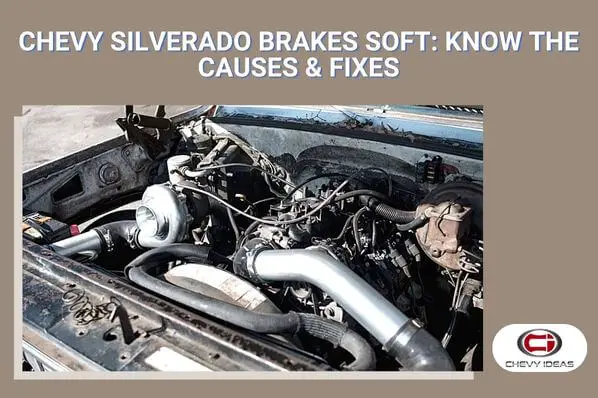Chevy Silverado truck brakes are usually very firm and solid. So if you press it down, it instantly triggers the parts inside your truck to stop the vehicle slowly. But sometimes the brakes can feel soft or spongy, which just feels uncomfortable in general and can even lead to accidents.
Because of this, many people ask about what to do when Chevy Silverado brakes soft. Simply flushing or changing the brake fluids can fix a soft or spongy brake most of the time, as they get more moisture over time.
There’s much more to it than just that, though. So today, I’ll be going over the causes of a soft brake, how to prevent it, and how to fix it. So without further ado, let’s get started.

Most Common Problems & Solutions of Chevy Silverado Brakes Soft
Here’s a table of all the causes that might cause your Chevy Silverado brakes to be soft and how to fix them in short. We’ll discuss it in more detail later on —
| Problem | Solution |
| Air inside the brakes | Bleeding the brakes |
| Rusty brake lines | Replace the brake lines or get them professionally cleaned |
| Faulty master cylinder | Clean the master cylinder. If this still doesn’t fix the issue, replace it. |
| Leaking or rusty disc brake calipers | Bleed the brake fuel or replace the disc brake calipers |
| Rusty ABS modulator | Get it professionally cleaned or replace it completely |
How To Fix Chevy Silverado Brakes Soft?
Here’s a list of all the most common ways you can fix and even prevent getting soft brakes on a Chevy Silverado —
Problem 1: Air inside brakes
As mentioned earlier, the air inside your brake lines is one of the most common, if not the most common reasons your brakes might feel soft. This is because when air gets inside the brake fluids, it can disrupt the flow of the fluids leading to a soft or spongy feel to your brakes.
The Fix: But you can prevent this from happening by flushing the brake fluids, also known as bleeding the brakes.
Problem 2: Rusty Brake Lines
Brake lines are usually made of materials that aren’t resistant to corrosion, such as steel tubing. This makes them rust over time, leading to possible leaks. And if your brake fluid leaks, your brakes will feel soft because of the lack of hydraulic pressure.
The Fix: You can fix this by simply changing the brake lines if they’re too rusty or getting them professionally cleaned.
Problem 3: Faulty Master Cylinder
Master cylinders work as a piston to pressurize the brake lines onto each cylinder allowing you to decelerate your vehicle. If these get dirty or have leaks, your brakes might not function properly and can be soft or spongy.
Aside from the brake fluid, the master cylinder plays a huge role in making your brakes work. If this is faulty, you’re very likely to get soft brakes.
The Fix: You can simply prevent this by bleeding the brake fluids, but if you already have a faulty or dirty master cylinder, you should first take it out.
Then remove the parts and clean everything. It’s best to replace it entirely and sell the old parts, but if not, at least clean it. After that, put your new or cleaned master cylinder back, and you’re good to go.
Problem 4: Leaking Or Rusty Disc Brake Calipers
A disk brake caliper is another part of the brakes that help to stop the vehicle physically. These can get corroded with rust, just like the brake lines, causing them to leak and creating a soft brake.
The Fix: You can fix this by simply replacing the disk brake calipers and bleeding the brake fuel every now and then. Clean fuel can keep all the parts in your Chevy Silverado working properly.
For example, if your parking brake light stays on Chevy Silverado, it’s usually caused by a faulty parking brake cable or pressure on the cable. This can happen under many circumstances, but a lot of the time, it’s due to other parts leaking fuel onto the cables.
Problem 5: Rusty ABS Modulator
The ABS hydraulic assembly, also known as an ABS modulator, is one complicated part of making emergency brakes work. This can get debris stuck inside it or rust, causing the brakes to malfunction.
The Fix: You can fix this by getting it cleaned professionally. It shouldn’t take much money, but it can vary highly depending on where you live. If the ABS is very old, I recommend you to just change it and sell the old one.
Frequently Asked Questions (FAQs)
Now that you have a good idea of Chevy Silverado brakes and why they can feel spongy or soft, here are some of the most frequently asked questions —
The Chevy Silverado brake line fitting size is 3/16 inches. This is the universal brake line length for most cars and trucks all around the world, including the Chevy Silverado.
Overall, most master cylinder reservoirs will cost you anywhere from $50 to $250, depending on the quality. Most of the time, a simple $50 one, such as the Dorman M630031
Generally, bleeding your brakes every 1-2 years will work fine. If you see that you’re getting a soft or spongy brake only a few months or barely a year after you got your Chevy Silverado, it’s likely due to some other reason, such as leaks or rust. If this is the case, just replace those parts.
Although the price depends on different places, it’ll usually cost around $800 to $900 for the ABS modulator itself and an additional $100 for the labor not including the taxes and other fees. Since it’s so expensive, we’d highly recommend you just get it professionally cleaned. This service usually can take between $100 to $300.
Conclusion
Hopefully, now you have a good idea of why Chevy Silverado brakes soft and how to fix them. To recap, soft brakes are mostly caused by leaks, rust, or air inside your brake lines. You can prevent these by simply bleeding your brake fuel every few years and cleaning your parts.
If the parts are rusted too much, I’d recommend you to just buy a brand new part. New parts will always work better. And sometimes, the effort is just not worth it to clean damaged or dirty truck parts.
So as a final tip, I highly recommend you to get your Chevy Silverado parts cleaned professionally every 1-2 years. This usually won’t cost more than $100 to $200, and it’ll keep your car safe. With that said, cheers!
